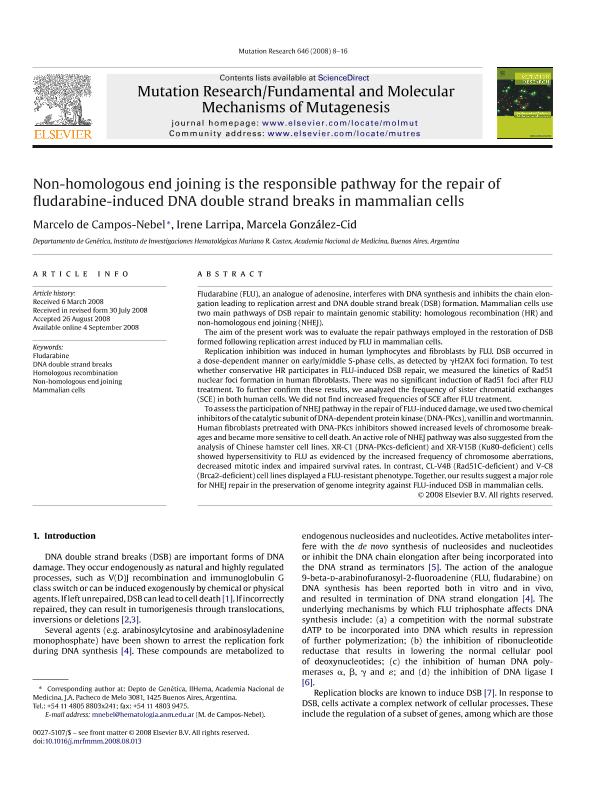Mostrar el registro sencillo del ítem
dc.contributor.author
de Campos Nebel, Ildefonso Marcelo

dc.contributor.author
Larripa, Irene Beatriz

dc.contributor.author
Gonzalez Cid, Marcela Beatriz

dc.date.available
2018-08-16T18:26:39Z
dc.date.issued
2008-11
dc.identifier.citation
de Campos Nebel, Ildefonso Marcelo; Larripa, Irene Beatriz; Gonzalez Cid, Marcela Beatriz; Non-homologous end joining is the responsible pathway for the repair of fludarabine-induced DNA double strand breaks in mammalian cells; Elsevier Science; Mutation Research-fundamental And Molecular Mechanisms Of Mutagenesis; 646; 1-2; 11-2008; 8-16
dc.identifier.issn
0027-5107
dc.identifier.uri
http://hdl.handle.net/11336/55967
dc.description.abstract
Fludarabine (FLU), an analogue of adenosine, interferes with DNA synthesis and inhibits the chain elongation leading to replication arrest and DNA double strand break (DSB) formation. Mammalian cells use two main pathways of DSB repair to maintain genomic stability: homologous recombination (HR) and non-homologous end joining (NHEJ). The aim of the present work was to evaluate the repair pathways employed in the restoration of DSB formed following replication arrest induced by FLU in mammalian cells. Replication inhibition was induced in human lymphocytes and fibroblasts by FLU. DSB occurred in a dose-dependent manner on early/middle S-phase cells, as detected by γH2AX foci formation. To test whether conservative HR participates in FLU-induced DSB repair, we measured the kinetics of Rad51 nuclear foci formation in human fibroblasts. There was no significant induction of Rad51 foci after FLU treatment. To further confirm these results, we analyzed the frequency of sister chromatid exchanges (SCE) in both human cells. We did not find increased frequencies of SCE after FLU treatment. To assess the participation of NHEJ pathway in the repair of FLU-induced damage, we used two chemical inhibitors of the catalytic subunit of DNA-dependent protein kinase (DNA-PKcs), vanillin and wortmannin. Human fibroblasts pretreated with DNA-PKcs inhibitors showed increased levels of chromosome breakages and became more sensitive to cell death. An active role of NHEJ pathway was also suggested from the analysis of Chinese hamster cell lines. XR-C1 (DNA-PKcs-deficient) and XR-V15B (Ku80-deficient) cells showed hypersensitivity to FLU as evidenced by the increased frequency of chromosome aberrations, decreased mitotic index and impaired survival rates. In contrast, CL-V4B (Rad51C-deficient) and V-C8 (Brca2-deficient) cell lines displayed a FLU-resistant phenotype. Together, our results suggest a major role for NHEJ repair in the preservation of genome integrity against FLU-induced DSB in mammalian cells. © 2008 Elsevier B.V. All rights reserved.
dc.format
application/pdf
dc.language.iso
eng
dc.publisher
Elsevier Science

dc.rights
info:eu-repo/semantics/openAccess
dc.rights.uri
https://creativecommons.org/licenses/by-nc-sa/2.5/ar/
dc.subject
Dna Double Strand Breaks
dc.subject
Fludarabine
dc.subject
Homologous Recombination
dc.subject
Mammalian Cells
dc.subject
Non-Homologous End Joining
dc.subject.classification
Toxicología

dc.subject.classification
Medicina Básica

dc.subject.classification
CIENCIAS MÉDICAS Y DE LA SALUD

dc.title
Non-homologous end joining is the responsible pathway for the repair of fludarabine-induced DNA double strand breaks in mammalian cells
dc.type
info:eu-repo/semantics/article
dc.type
info:ar-repo/semantics/artículo
dc.type
info:eu-repo/semantics/publishedVersion
dc.date.updated
2018-08-13T18:47:31Z
dc.journal.volume
646
dc.journal.number
1-2
dc.journal.pagination
8-16
dc.journal.pais
Países Bajos

dc.journal.ciudad
Amsterdam
dc.description.fil
Fil: de Campos Nebel, Ildefonso Marcelo. Consejo Nacional de Investigaciones Científicas y Técnicas; Argentina. Academia Nacional de Medicina de Buenos Aires. Instituto de Investigaciones Hematológicas ; Argentina
dc.description.fil
Fil: Larripa, Irene Beatriz. Consejo Nacional de Investigaciones Científicas y Técnicas; Argentina. Academia Nacional de Medicina de Buenos Aires. Instituto de Investigaciones Hematológicas ; Argentina
dc.description.fil
Fil: Gonzalez Cid, Marcela Beatriz. Consejo Nacional de Investigaciones Científicas y Técnicas; Argentina. Academia Nacional de Medicina de Buenos Aires. Instituto de Investigaciones Hematológicas ; Argentina
dc.journal.title
Mutation Research-fundamental And Molecular Mechanisms Of Mutagenesis

dc.relation.alternativeid
info:eu-repo/semantics/altIdentifier/doi/https://dx.doi.org/10.1016/j.mrfmmm.2008.08.013
dc.relation.alternativeid
info:eu-repo/semantics/altIdentifier/url/https://www.sciencedirect.com/science/article/pii/S0027510708001905
Archivos asociados
